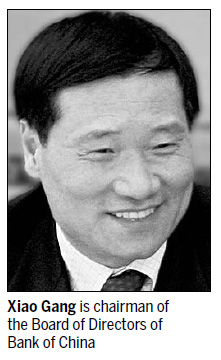Op-Ed Contributors
If it ain't broke, don't fix it
Updated: 2011-03-11 08:00
By Xiao Gang (China Daily)
|
|
The merger of NYSE Euronext and Deutsche Boerse, a defining event of the accelerated financial globalization in 2011, creates the world's largest stock exchange. It starts a new round of competition in the exchange industry among the international financial centers. Hong Kong, as one of China's international financial centers, must actively address the challenges on its own instead of simply following suit.
Usually, stock and futures exchanges, with their safe and efficient operations, are portrayed as an important part of a country or a region. Securities and derivatives are traded under local regulatory frameworks and supervision.
In the 1990s, however, the global exchange industry entered an internationalization period because of intensified competition. The London Stock Exchange has bought Borsa Italiana and is in talks to buy TMX Group, owner of the Toronto stock exchange. Nasdaq has bought OMX, a Swedish-Finnish financial exchange company. The Singapore Exchange is trying to take over the Australian Securities Exchange. Even Chicago's two big exchanges have merged. Also, BATS Global Markets is in talks to set up a new stock exchange in Brazil.
The rationale for such mergers is that exchanges tend to attract even more new listings and can provide an enlarged customer base with different suites of products. In particular, the more lucrative business of trading in futures and options and other derivatives contracts, and the settlement and clearing business is enhanced.
The consolidation (or merger) can also help create a "jetlag-free", non-stop trading of "24/7 global pools of liquidity", and combine the information technology systems and business platforms, again cutting costs and raising efficiency.
On the other hand, it should be noted that behind the recent spate of exchange mergers is the old competition among the leading international financial centers. In essence, every financial center wants to increase its influence in the global market. For quite some time, the New York Stock Exchange has been considering ways to access China's market. As proclaimed by top managers of NYSE Euronext and Deutsche Boerse (or German Stock Exchange), one of the main purposes behind the merger is to make greater inroads into the Asian market - because they see the Asia-Pacific region as the heart of global growth.
Though Hong Kong Exchange and Clearing Ltd stocks dropped 5 percent (the biggest one-day fall in two years) a day after NYSE Euronext and Deutsche Boerse announced their merger plan, the Hong Kong exchange has been the world's biggest bourse in terms of IPOs for the past three years. In responding to the challenges from its peers, Hong Kong has a unique competitive advantage that is difficult for other international financial centers to acquire, that is, the "China factor".
Hong Kong has been both the largest source of foreign direct investment into and the largest recipient of overseas direct investment from the Chinese mainland. It also plays the vital role as a gateway through which foreign enterprises can enter the mainland and as a springboard for mainland firms to go abroad.
Currently, mainland-related enterprises account for about 60 percent of the market's Hang Seng capitalization, and about 70 percent of its daily turnover. Given the large potential inherent in the process of financial globalization on the Chinese mainland, Hong Kong will no doubt continue to be a perfect place for moving funds.
A new key driver for Hong Kong's market growth in the future will be the offshore yuan business, including yuan financing, bonds, trade settlement, investment and even wealth management. Hong Kong is uniquely positioned as the biggest offshore yuan center.
Furthermore, with the "China factor" rapidly growing, Hong Kong should focus more on emerging economies by levering its unparalleled strength to facilitate trade and investment between the China and other emerging economies. In doing so, there are more things for it to do to promote multiple currencies' payment and settlement among the developing economies.
It is imperative to attract more enterprises in emerging economies and multinationals to obtain capital from the Hong Kong market, and then invest it back into other emerging economies. This would give Hong Kong a bigger footprint in the booming emerging markets.
There is no fundamental conflict between the two financial centers in China: Hong Kong and Shanghai. Neither of the stock exchanges faces an immediate threat of a business slowdown or falling profits - factors which forced their counterparts in other international financial centers into the cross-border mergers. Both bourses have room to make full use of the "China factor" to develop themselves. Shanghai is planning to launch its international board that will allow foreign companies to list on the Chinese mainland, and Hong Kong is building a platform to permit companies to sell yuan-denominated shares.
Considering the time necessary for the gradual process of liberalizing capital controls on the mainland, Shanghai as a financial hub will not be a strong rival to Hong Kong for a long time. Each time a financial crisis breaks out, there could be a wave of exchange mergers that may create risks for the world. The non-stop cross-border transactions will flatten economic policies' efficacy in countries, reduce states' intervening potency, and magnify the markets' fluctuations and systemic risks. Hong Kong and Shanghai must be ready to strengthen their capabilities to address potential severe shocks from the world markets.
To "keep doing what we are doing" is the best way for Hong Kong to keep pace with New York and London. Not only should Hong Kong continue to learn the best practices from the West, but also and more importantly it must be an innovator and a leader rather than just a follower.
Specials

Earthquake Hits Japan
A massive 8.8 magnitude quake hit the northeast coast of Japan on March 11,2011.

NPC & CPPCC sessions
Lawmakers and political advisers gather in Beijing to discuss major issues.

Pictures: quake aftermath
A massive earthquake hit Japan hard, leaving thousands dead.
